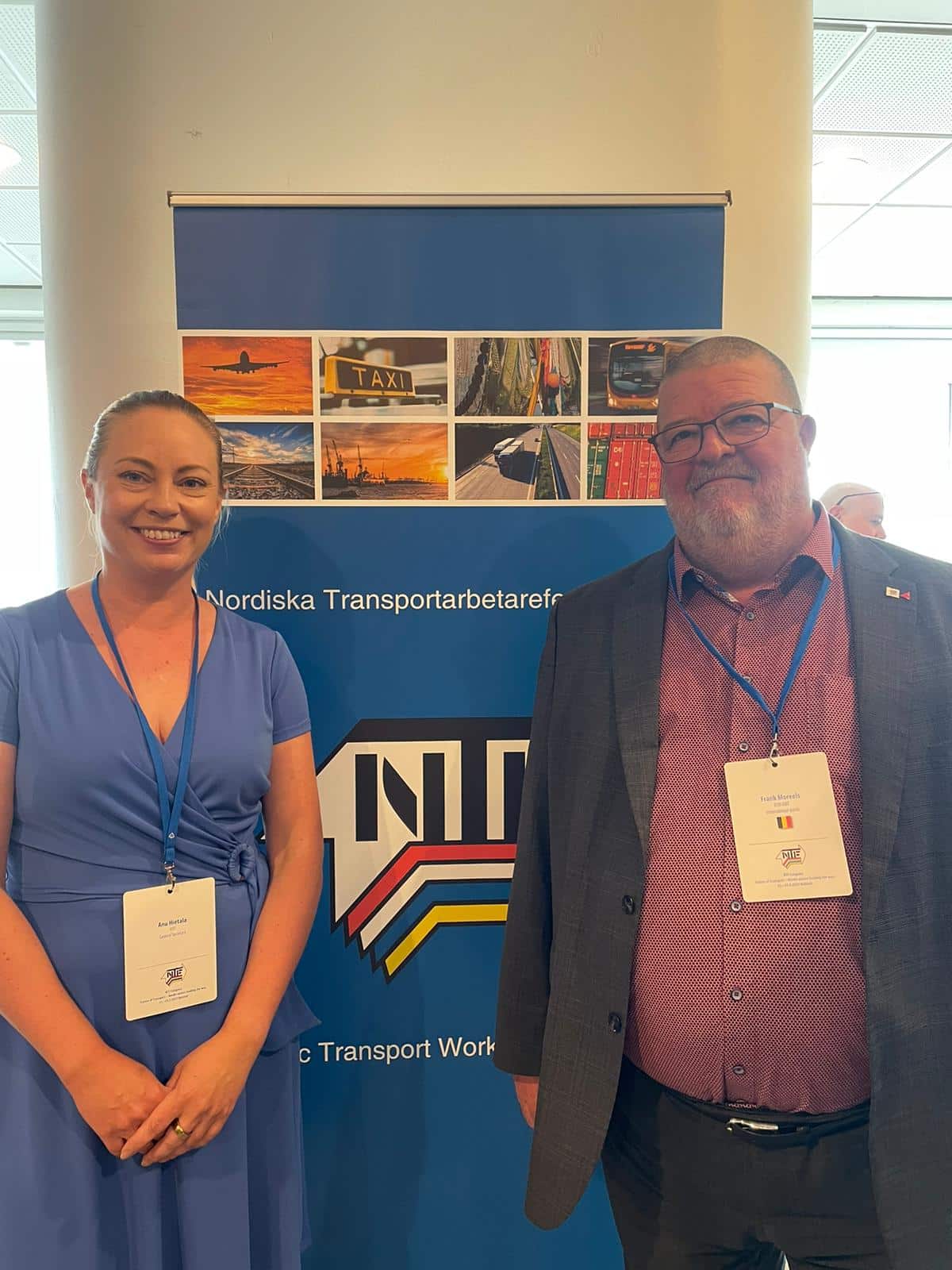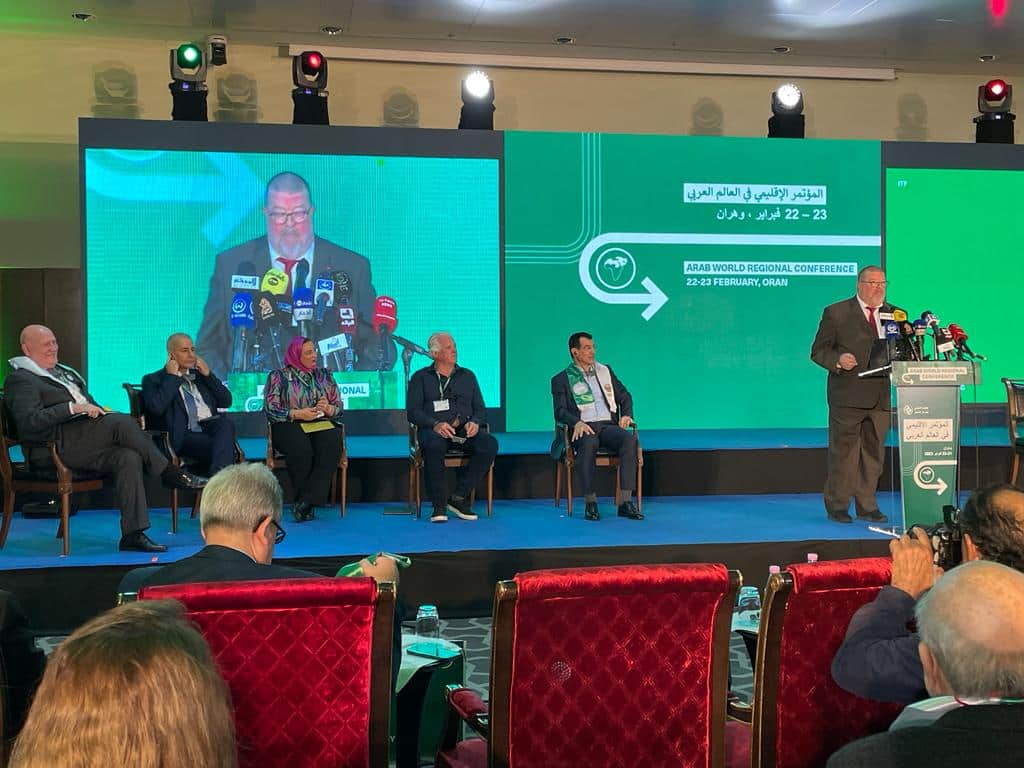
Congrès FEETS-FO
Mercredi 11 octobre 2023 j’ai eu l’honneur de faire un discours au Congrès du FEETS-FO à Toulouse. FEETS-FO est la Fédération de l’Equipement, de l’Environnement, des Transports et des Services Force Ouvrière en France. Vous pouvez lire ci-dessous l’intégralité de mon discours.
Chers camarades,
En tant que Président de l’ETF je vous apporte les salutations les plus fraternelles de 5 millions d’affiliés. Appartenant à 200 organisations syndicales en 38 pays de l’Europe.
Je dois aussi excuser Livia Spera, notre secrétaire générale qui aurait voulu être parmi nous. Mais elle est appelée à d’autres devoirs. Nous avons dû repartir le travail, elle et moi, et je suis heureux de pouvoir représenter notre ETF.
C’est un honneur pour moi, d’être parmi vous.
Feets-FO est particulièrement actif au niveau international et je voudrais donc saisir le moment de vous remercier pour votre engagement au niveau international à l’ETF et à l’ITF.
Plus particulièrement dans la personne de Laurent LeFloch
Mais aussi par votre engagement dans les sections de l’ETF, et à l’ITF.
Mais quand je vois la dynamique de vos débats,
Les activités que vous déployez dans de nombreux secteurs.
Quand je vois la conviction syndicale, je veux vous inviter à vous engager encore d’avantage.
A l’ETF nous avons besoin de syndicats qui veulent marquer la différence. De syndicats qui veulent faire bouger des choses
Ausons le dire, de syndicats qui rêvent de changer le monde, et qui travaillent jours après jour pour le faire.
Camarades, le discours de votre secrétaire général hier était tellement inspirant, motivant, … Et tellement juste que c’est difficile d’y ajouter beaucoup.
Mais, permettez-moi de faire le topo de quelques défis avec lesquels nous sommes confrontés au niveau Européen, et donc des défis que l’ETF et l’ITF ont à affronter.
Évidemment il y a le défi climatique qui est particulièrement problématique au niveau global, et donc aussi pour les travailleurs du secteur du transport,
Je ne pense pas que je dois encore vous convaincre des conséquences du réchauffement de la terre, et des conséquences que cela à partout dans le monde.
Bien qu’il y a certains politiciens qui relativisent l’impact du réchauffement climatique, nous vivons tous cet impact.
Les incendies partout dans le monde, de la Grèce au Canada, via l’Espagne, …
La montée du niveau de la mer, qui risque de faire disparaître des îles entières dans la mer, et de mettre en péril nos côtes … La qualité de l’air qui met en danger la santé de la population,
Les problèmes sont réels et des solutions doivent être développées.
Et si nous parlons des secteurs du transport, nous savons que nous faisons partie du problème.
L’industrie dans laquelle nous travaillons est particulièrement polluante.
Le transport de marchandises par route par exemple, mais aussi le secteur de l’aviation, sont des plus polluants.
Nous savons qu’une partie de notre industrie sera concernée si nous voulons apporter des solutions durables.
Toute la question est de savoir qui payera le prix de la transition. Les travailleurs ou les pollueurs? Ceux qui travaillent dans nos secteurs, ou ceux qui ont fait du profit pendant des années?
Nous devons interpeller les employeurs d’investir dans des technologies durables.
Nous devons nous battre pour avoir des garanties que nos affiliés gardent leur emploi. Nous devons mettre pression sur les politiques pour que des mesures justes et sociales soient prises.
Et n’est il pas juste de demander que les plus riches payent d’avantage de taxes pour financer la transition?
Et il faut savoir que nous avons aussi une partie de la solution dans nos secteurs.Il faudra des investissements dans le transport en commun. Puisqu’un transport public efficace et abordable pour les utilisateurs est une des réponses à la problématique climatique.
Mais cela veut dire aussi que nous devons nous battre contre la privatisation et la libéralisation du rail et du transport public dans nos villes.
Plaider pour la durabilité, et en même temps privatiser et libéraliser est une contradiction que nous ne pouvons pas accepter.
Parlons aussi de la digitalisation et de l’automatisation. La révolution digitale que nous vivons de nos jours va de plus en plus vite. La numérisation et l’Intelligence artificielle ont un impact énorme sur nos secteurs du transport.
La « gig économie » a boulversé nos secteurs. De grandes entreprises comme Amazon dans le secteur de la logistique,
Uber dans le secteur des taxis, Deliveroo, dans la livraison de repas, … imposent un business model inacceptable.
Ils ne considèrent leurs collaborateurs non comme des employés, mais comme des indépendants,imposent une flexibilité à outrance et fuient toute responsabilité en cas d’accident de travail, ou autre.
Nous pensons que nous devons combattre le modèle que ces sociétés essayent de nous imposer, mais nous sommes aussi convaincus que nous ne devons pas laisser les gens qui travaillent pour ces sociétés sans protection.
A nous d’organiser ceux qui sont exploités par ces nouveaux joueurs dans le monde du transport.
A nous d’organiser le combat, aussi chez Uber, Bolt, Deliveroo et Amazon.
Et je suis heureux de constater que FO participe au réseau de Just Eat/Takeaway crée par l’ETF
Camarades,
Je suis extrêmement préoccupé par la montée du populisme et de l’ampleur que des parties de l’extrème droite prennent.
Je sais que je ne dois pas vous convaincre, vous les Français, de ce danger, avec Marine le Pen du Rassemblement National qui, à chaque élection, risque de prendre plus de pouvoir.
Je me rappelle le défi moral que beaucoup d’entre vous ont eu, quand ils devaient voter soit pour Le Pen, soit pour Macron lors du deuxième tour des dernières éléctions présidentielles.
Et dans des pays avec une tradition sociale-démocrate, comme la Finlande, la Suède … l’extrême droite participe aujourd’hui au pouvoir.
Tout comme en Italie ou l’extrême droite a pris le leadership du gouvernement avec Giorgia Meloni comme premier ministre.
Donc ma question est bien simple, camarades:
Est-ce que nous allons laisser passer?
Ou est-ce que nous allons nous battre?
Il faut se mobiliser, camarades.
Il faut se battre contre cette dérive à droite.
Et ne nous trompons pas, camarades,
La première chose que les nazi on fait,
Quand ils avaient le pouvoir, le 2 mai 1933, Hitler a dissous les syndicats allemands, confisqué leurs biens, et il a commencé à emprisonner les leaders syndicaux.
L’extrême droite essaie de séduire la classe ouvrière avec un discours de haine, de division et d’exclusion.
Il ne faut pas se tromper!
Ne pas se faire piéger par leur discours d’exclusion.
Leur discours de division.
Leur discours de hain.
Leur discours raciste!
Souvenons nous de Jean Jaurès, camarades. Il nous disait:
Il n’y a qu’une race,
C’est l’humanité! C’est pour cette même raison que l’ETF a proposé de faire du 8 mai une journée de commémoration et de congé collectif au niveau européen.
Le 8 mai est la fin de la deuxième guerre mondiale, et donc la victoire de la démocratie sur le nazisme.
Avec les élections européennes devant la porte, l’ETF a décidé de mener une campagne active. Nous voulons propager nos priorités vis-à-vis du monde politique,
Il faut convaincre les partis politiques et leurs candidats de soutenir notre vision sur le monde du transport. Parce que si le parlement européen et le conseil capotent vers plus de droite, voir extrême droite, cela ne promet pas beaucoup de bien pour les travailleurs que nous représentons.
C’est aussi pour cela que l’ETF appelle à une participation massive à la manifestation organisée par la Confédération Européenne des syndicats le 13 décémbre à Bruxelles.
Une manifestation contre l’austérité qui se dessine déjà dans la politique de la commission. Une manifestation contre l’obsession à la privatisation et la libéralisation de la Commission,
Une manifestation pour une Europe plus sociale qui garantie un soccle de protection sociale pour tous les travailleurs en Europe!
J’espère voir les drapeaux de Force Ouvrière bien présents dans les rues de Bruxelles le 13 décembre prochain!
Camarades, les grands pas en avant dans le mouvement ouvrier ont toujours été réalisés par la lutte syndicale
Nous n’avons jamais rien obtenu en le demandant gentiment. Nous avons dû nous battre
Et c’est exactement ce que nous devons continuer à faire.
Ensemble!
En France!
En Europe!
Et au niveau mondial!
Parce que… ensemble nous sommes plus forts!











